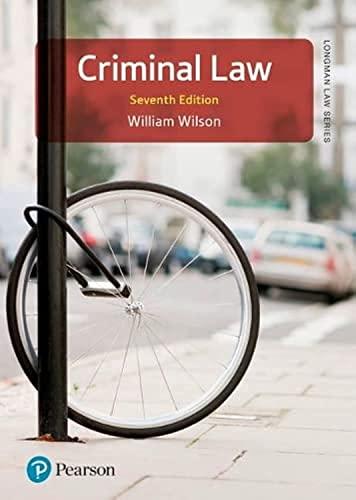Question
Acme Pty Ltd is a company involved in residential property development in southern Sydney. Acme purchases older style properties and then demolishes the houses and
Acme Pty Ltd is a company involved in residential property development in southern Sydney. Acme purchases older style properties and then demolishes the houses and converts the properties into townhouses. The directors of Acme are a married couple Elizabeth and Henry. Elizabeth usually handles management affairs while Henry is a qualified builder and overseas all building work carried on by the company.
The shareholders of Acme are Elizabeth and Henry's adult children (Henry junior, Mark and Beth), each of whom holds 100 class B ordinary voting shares. The company's constitution also provides for 2 class A directors' shares, with 1 held by each of Elizabeth and Henry. These shares carry the right to appoint a 'governing director' who is given complete discretionary power under the terms of the company's constitution but can only be appointed by a unanimous vote of the class A shareholders. No such vote has been conducted, but Elizabeth usually handles all management decisions and acts as the governing director. The class A shares do not carry votes on any other matter, although they give a power of veto to new board appointments (so both class A shareholders can agree to refuse new board members), nor do the shares carry a right to receive dividends.
The company's constitution states that it adopts the replaceable rules in the Corporations Act, but it replaces s198A by stating that the management power of the board is subject to any appointment of a governing director. Furthermore, the constitution states that the board must not commit more than $2 million of the company's funds to any single project without first obtaining the permission of all shareholders by passing an ordinary resolution at a meeting of members. The constitution also provides that remuneration for board members shall be approved by the members in a general meeting.
For the duration of the company's 10 year history Elizabeth, who has an MBA, has always conducted the management of the company. From time to time, Henry signs documents when Elizabeth asks him to, but he mostly leaves management decisions to Elizabeth.
Recently tension has been building in the family over Elizabeth's management style. The children are not happy with the direction of the company and want changes to the made. They have written to their parents asking that the company reduce the number of building projects undertaken at any one time and that the company focus on more profitable commercial developments rather than residential developments. The directors reject this request. Henry and Elizabeth then commit 60% of the company's capital (over $10 million) to a massive new residential development in Caringbah. The children are outraged at this risky move, but the directors simply state that the project was noted at the last shareholder meeting without dissent. The meeting referred to, was a family dinner last month where Elizabeth passed around a large document that outlined the company's current and future business activities. No one bothered to read it because the football semi-finals were on TV. Elizabeth and Henry took this as agreement from the shareholders and implemented the proposals outlined in the document.
The children write to the board demanding that a shareholders' meeting be convened, and proposing the following resolutions:
1. changing the constitution to require the board to refer all projects to shareholders for prior approval;
2. requiring the board to submit monthly accounts to shareholders;
3. if resolutions 1 and 2 are not passed, then removing Elizabeth from the board and installing each of the shareholders as directors.
Elizabeth and Henry refuse to convene the shareholders meeting on the basis that the proposed resolutions are invalid and they can therefore be ignored. Elizabeth argues that she is fully authorised to make any and all decisions for the company because she has been acting as governing director for the past 10 years and also that the shareholders specifically approved of her decisions by agreeing to the report distributed at the last shareholder meeting. The children say that if the directors won't convene a meeting, then they will. Elizabeth threatens to exercise her power as Governing Director and cause the company to issue new class B shares to herself and Henry so that they can outvote the children.
Advise Elizabeth as to her legal position under general principles of corporate law and under the Corporations Act 2001 (Cth).
Step by Step Solution
There are 3 Steps involved in it
Step: 1

Get Instant Access to Expert-Tailored Solutions
See step-by-step solutions with expert insights and AI powered tools for academic success
Step: 2

Step: 3

Ace Your Homework with AI
Get the answers you need in no time with our AI-driven, step-by-step assistance
Get Started


